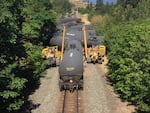
A train carrying crude oil derailed near the Columbia River Gorge town of Mosier, Oregon, in June 2016.
Emily Schwing / OPB
Thick black smoke that spewed from a derailed oil train burning in Mosier, Oregon, was not the visual Vancouver Port Commissioner Jerry Oliver wanted in people’s minds.
“It was unfortunate for the community," Oliver said. "It’s also unfortunate because it gives a tremendous black eye to anything related to fossil fuels.”
Oliver has been a vocal supporter of what would be the largest oil-by-trail terminal in the country, known as the Vancouver Energy Project. It’s controversial, to the point Oliver said he’s even lost friends over his stance.
The oil terminal in Vancouver would be built just 70 miles downriver from Mosier, Oregon. In a way, the two are linked: The project would help move 360,000 barrels of crude oil from North Dakota to West Coast ports. It would also more than double the number of oil trains traveling through the Columbia River Gorge to about 46 trains per week.
Oliver equates June’s derailment to the airline industry – where thousands of planes land safely every day.
“I think you have to consider, accidents do happen," he said.
Related: Union Pacific Stands Out For Track-Caused Derailments But Not Oil Spills
The
image of June’s fiery oil train derailment in the Columbia River Gorge
was poor timing for backers of a proposed oil terminal in Vancouver. The derailment came just as the Washington’s energy council started
five weeks of testimony on the oil terminal
. In a way, the image served as a vivid example of what critics have warned could happened should the project get built.
The energy council will make a recommendation to Gov. Jay Inslee later this year. Whether or not Inslee decides to permit the project, it’s possible his decision will be appealed to the state’s Supreme Court.
Serena Larkin with the Sightline Institute, a Seattle-based think tank that opposes the oil terminal, said until the crash in June; oil train derailments were thought of as the kind of things that happen somewhere else.
“Mosier proved that we’re not any different, we are just as vulnerable, we are facing the exact same risks from oil trains that everyone else in North America is facing right now," Larkin said.
She said the Mosier derailment is a turning point for the debate surrounding the Vancouver project and one that will weigh heavily on whether Inslee allows the project to move forward.
“Mosier is a unique moment," Larkin said. "It showed what the Vancouver oil terminal is really asking Northwest communities to shoulder in risk.”
Related: NW Cities Turn To Local Action To Block Oil Trains
Since the derailment in Mosier,
there has been more scrutiny of the rail system
, but not of the project, said Dan Riley, vice president of government affairs for Tesoro Corp., the oil company backing the project.
Riley said Tesoro has pledged to only allow tank cars with thicker shells and other safety features designed to withstand a derailment into the Vancouver facility.
“I strongly believe that all accidents are preventable," he said. "There are no guarantees. But by utilizing the different things that I’ve spoke of, by managing the overall value chain I believe that we can operate this facility safety.”
That’s done little to ease the safety concerns of firefighters and environmental groups.
Safety measures were taken prior to the derailment in Mosier. But a federally certified rail inspector missed broken bolts during an inspection a little more than a month before the tracks failed.
Brent VandenHeuvel, the executive director for nonprofit environmental group Columbia Riverkeeper, which opposes the oil transfer project in Vancouver, said what happened in Mosier proves current safety measures don’t always work.
“The main message is: there’s no way to safely transport oil-by-rail and we need to put an end to it. And inviting more trains by approving an oil terminal in Vancouver is absolute insanity," he said.
VandenHeuvel's message appears to be gaining momentum. Last week, Washington Attorney General Bob Ferguson said the risk and cost of an oil spill outweigh the potential benefits of the terminal.
During an interview with OPB in July, Gov. Inslee acknowledged the risk oil trains pose. He said the Mosier derailment is among the things he'll consider when determining whether or not he'll permit the oil terminal in Vancouver.
